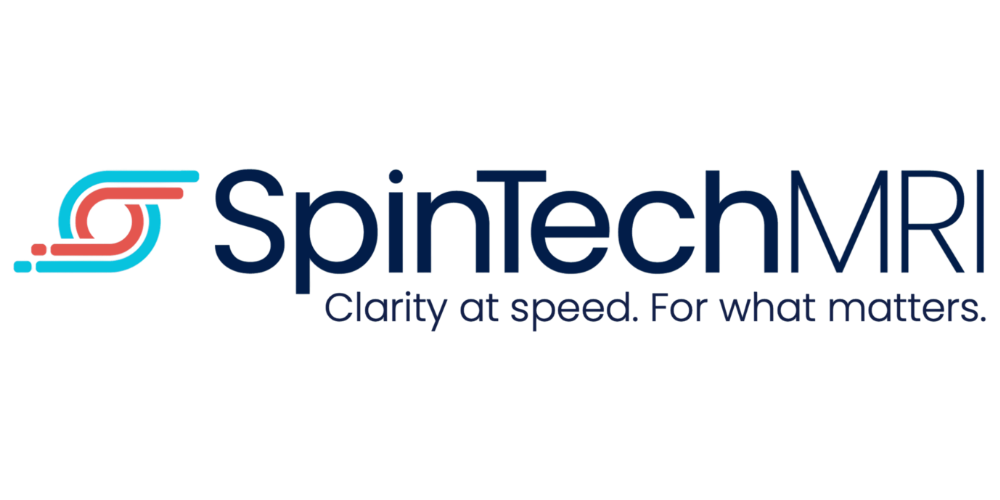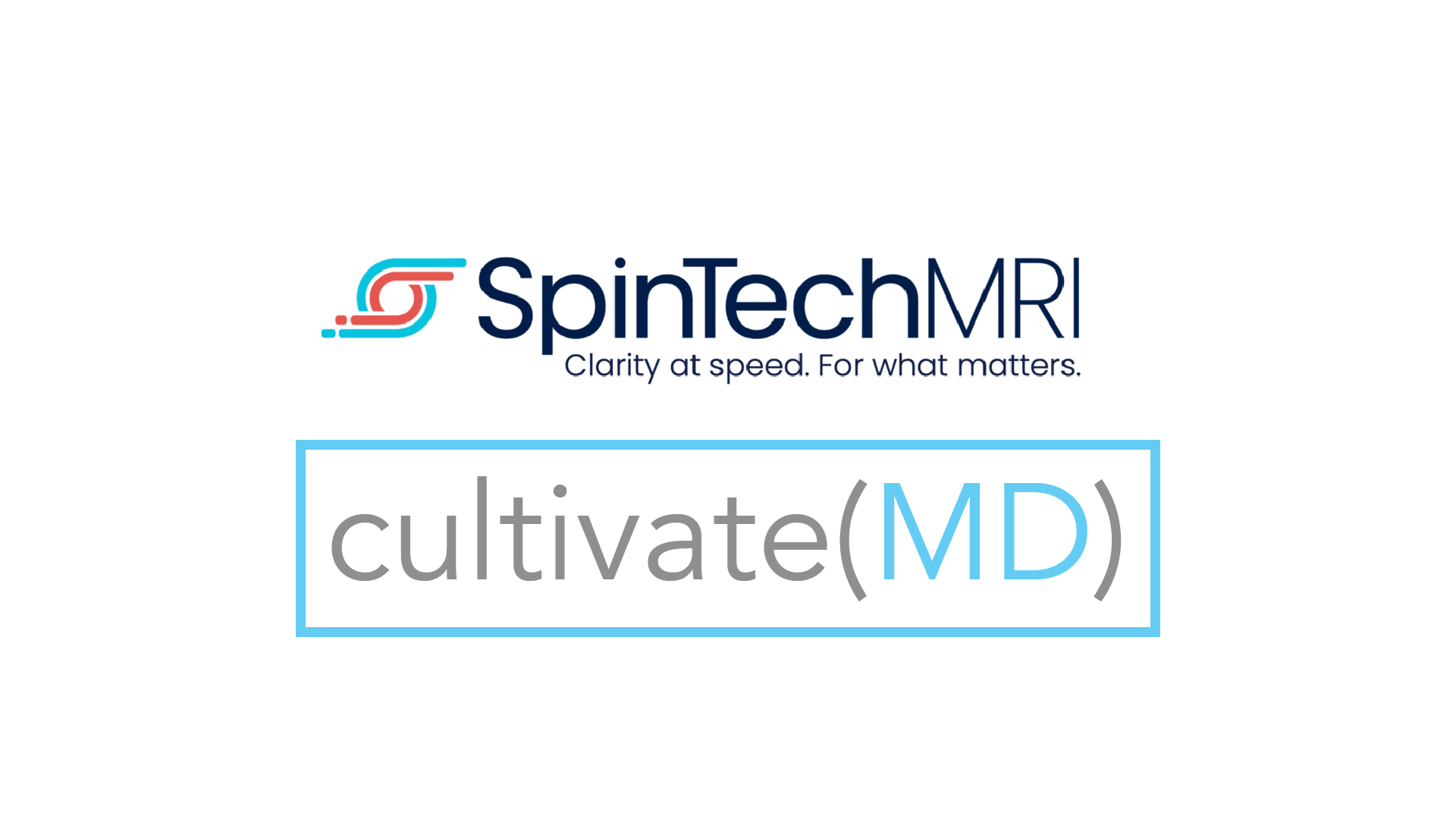SpinTech MRI
SpinTech has created a range of software that provides groundbreaking improvements for MRI brain scans.

Speed With Clarity. Care Without Compromise.
SpinTech has crafted the STAGE™ platform, a groundbreaking innovation that elevates the standard of MRI brain imaging. This technology not only enhances image visualization and clarity but also seamlessly integrates with a diverse array of MRI machines.
STAGE™ stands out by offering quicker scan times, reducing them by up to 40%, while also enabling the gathering of detailed quantitative data. Distinct from AI-based systems, it harnesses the fundamental principles of MRI physics to deliver comprehensive, three-dimensional data.
This platform finds its significance in medical diagnostics, particularly in the early detection and monitoring of neurological conditions such as Alzheimer’s and Parkinson’s diseases.
Additionally, it plays a crucial role in identifying minute hemorrhages that are often associated with traumatic brain injuries, thus broadening its applicability in the medical field.
SpinTech's Mission
SpinTech’s objective is to redefine the capabilities of MRI technology, transforming advanced research methods into usable clinical applications. The company goes beyond its role as a software provider, acting as a collaborative partner in unleashing cutting-edge MRI possibilities to revolutionize clinical practices.
Emphasizing teamwork, SpinTech collaborates both within its organization and with some of the world’s foremost researchers. The company is committed to the belief that innovation flourishes through the acceptance and exploration of new ideas and methods, pushing the limits of MRI technology and advancing healthcare. This vision is brought to life by the dedicated team at SpinTech.
Technology & Products
STAGE™ Platform
- Enhances MRI brain scan quality by improving visualization and clarity.
- Integrates seamlessly with a wide range of MRI machines, including all 1.5T and 3T magnets.
- Offers up to 40% faster scanning times, adding 90–120 minutes of scan time per machine per day.
- Relies on MRI physics rather than AI, providing fully sampled, 3D data.
- Applicable in various medical conditions such as tumor detection, multiple sclerosis, traumatic brain injuries, stroke detection, aging and dementia, and Parkinson’s disease.
- Utilized in enhancing gray-white matter contrast, facilitating efficient reads, and reducing scan times by 30%.
- Capable of replacing standard, longer-duration GRE and SWI scans due to high sensitivity to cerebral microbleeds and thrombus.
- Improves the visualization and quantification of key brain areas, aiding in the early detection of diseases and the planning of treatments like deep brain stimulation (DBS).
Tumor Detection, Metastasis & Radiation Therapy: The STAGE™ platform offers multiparametric maps that significantly improve the ability to distinguish between tumor tissues, alterations in adjacent tissues, and blood products associated with tumors.
Moreover, STAGE™ facilitates the assessment of T1 and PD properties, which are indicative of changes in water content and the presence of leaky blood vessels. It also enhances the detection of cerebral microbleeds, often a consequence of radiation therapy.
Multiple Sclerosis: Lesions from Multiple Sclerosis, impacting the central nervous system, are noted to occur around the brain and spine, particularly in areas surrounding the veins.
The multiparametric maps produced by STAGE™ significantly improve the visibility of these lesions within the white matter. They also reveal various changes, including fluctuations in blood flow, inflammation levels, water content, susceptibility, iron deposition, tissue shrinkage, demyelination, and abnormal blood vessels linked with the lesions.
Traumatic Brain Injury: STAGE™ produces exceptionally detailed images of lesions and vascular damage caused by trauma, which might go undetected in standard or low-resolution scans.
This technology is especially effective for the precise visualization of cerebral microbleeds, injuries to the medullary veins, shearing damage, and subarachnoid hemorrhage.
Stroke Detection: STAGE™ can substitute traditional, lengthier GRE and SWI scans thanks to its heightened sensitivity to cerebral micro-bleeds and thrombi.
Additionally, it effectively illustrates features like asymmetrically prominent cortical veins, oxygenation levels in the surrounding penumbra of a stroke, focal stroke lesions, disruptions in angiography flow, and arterial irregularities in the Circle of Willis. The standardized outputs of STAGE™ also facilitate consistent baseline assessments and tracking changes over time through longitudinal image comparisons.
Aging & Dementia: STAGE™ enhances visualization and measurement of crucial brain regions, such as white matter/gray matter contrast and cerebrospinal fluid, neurovascular lesions, hemosiderin deposits, and the distinction between mineralization and hemorrhage.
It enables the visual identification of dephasing due to calcification or bleeding. Additionally, the T1 Map and T1W outputs of STAGE™ offer improved contrast differentiation among various tissue types.
Parkinson’s Disease: STAGE™ delivers both qualitative and quantitative results for the visualization of essential biomarkers. Its multiparametric maps, including QSM and R2*, are instrumental in quantifying iron content in deep gray matter structures and visualizing neuromelanin within the midbrain.
Additionally, STAGE™ offers automatic segmentation of brain structures. These capabilities are particularly valuable for early disease detection and guiding the surgical positioning of deep brain stimulation (DBS) devices.
Importance in Medical Field
- Their technology significantly reduces MRI brain protocol times by about 30%, which increases the efficiency of MRI scans in clinical settings.
- It aids in providing clearer and more detailed images for radiologists, neurologists, and neurosurgeons, enhancing diagnostic confidence.
- SpinTech MRI’s solutions have financial incentives for radiology departments by streamlining workflows, improving patient throughput, and potentially increasing reimbursement.
- They are collaborating with respected healthcare partners and institutions like Yale New Haven Hospital to assess the impact of STAGE™ in routine clinical use.

